
作者: Scientific American来源: Scientific American时间:2019-04-02 09:51:390
The traces we leave on the Web and on our digital devices can give advertisers and others surprising, and sometimes disturbing, insights into our psychology.
我们在网络和电子设备上留下的(信息)痕迹,可能会让广告商们和其他人趁机而入洞察我们的内心,这种行为让人始料不及,有时候甚至满心惶恐。
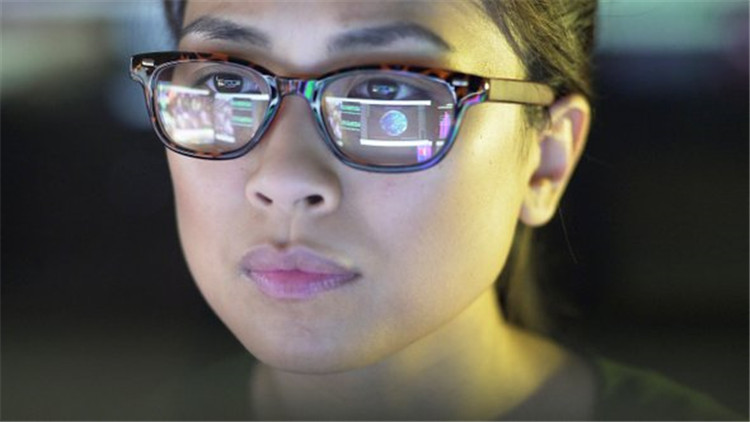
图片来源:Laurence Dutton Getty Images
IN BRIEF
内容提要
·Users’digital footprints disclose certain preferences and characteristics, such as their personality or mood.
·用户的数字足迹揭示了一定的偏好和特征,比如他们的个性或情绪。
·Companies are very interested in such data. Automated language analysis is already being used in the hiring of personnel. And advertising seems to be more successful when its message is adapted to the personality or mood of the customer.
·许多公司对这些数据非常感兴趣。自动化语言分析已经被用于雇用人员。当广告信息与受众者个性或情绪相匹配时,广告似乎更有效。
·These technological advances open opportunities not only for commerce but for public health. Among those possibilities: smartphone apps may in the future recognize when a bipolar patient is slipping into a depressive phase and can inform the person’s physician.
·这些技术上的进步不仅为商业,还为公共健康创造了机会。这些可能性包括:未来,智能手机应用程序可能会识别出双向情感障碍患者何时进入抑郁阶段,并及时通知患者的主治医生。
·But the technology poses risks. Unless it is managed carefully and ethically, it can invade privacy.
·但这项技术也存在风险:除非它被小心地,合乎道德地管理,否则它可能会对个人隐私造成侵犯。
If you enjoy computerized personality tests, you might consider visiting Apply Magic Sauce (https://applymagicsauce.com). The Web site prompts you to enter some text you have written—such as e-mails or blogs—along with information about your activities on social media. You do not have to provide social media data, but if you want to do it, you either allow Apply Magic Sauce to access your Facebook and Twitter accounts or follow directions for uploading selected data from those sources, such as your history of pressing Facebook’s “like” buttons. Once you click “Make Prediction,” you will see a detailed psychogram, or personality profile, that includes your presumed age and sex, whether you are anxious or easily stressed, how quickly you give in to impulses, and whether you are politically and socially conservative or liberal.
如果你对线上性格测试感兴趣,可以试着访问Apply Magic Sauce(由剑桥大学开发的知名个性化分析引擎,地址:https://applymagicsauce.com)。该网站会提示你输入一些你写过的文字——比如电子邮件或博客——以及你在社交媒体上的状态信息。你不需要提供社交媒体数据,但如果你想这么做,你要么允许Apply Magic Sauce访问你的Facebook和Twitter账户,要么按照指示从这些来源上传选定的数据,比如你在Facebook上点赞的历史。一旦点击“做出预测”,你就会看到一个详细的心理记录表或者是个性简介,包括你的预判年龄和性别,你是焦虑还是易紧张,你在失去理智情况下做出冲动行为的速度,你在政治和社会上是保守派还是自由派……
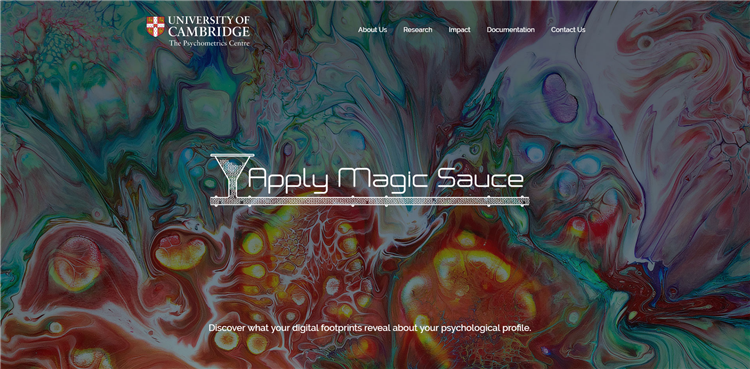
Examining the psychological profile that the algorithm derives from your online traces can certainly be entertaining. On the other hand, the algorithm’s ability to draw inferences about us illustrates how easy it is for anyone who tracks our digital activities to gain insight into our personalities—and potentially invade our privacy. What is more, psychological inferences about us might be exploited to manipulate, say, what we buy or how we vote.
研究该算法从在线信息痕迹中得出的“心理档案”,想必一定很有趣。另一方面,该算法对我们做出推断的能力也恰恰说明,任何人都能轻而易举地通过追踪“数字活动”从而获取我们的个性信息——而且很有可能侵犯我们的隐私。更重要的是,基于对这种心理推断的利用,我们的行为很有可能被操纵,比如,我们买什么或者我们的投票意向。
SURPRISING ACCURACY
惊人的准确度
It seems that our like clicks by themselves can be pretty good indicators of what makes us tick. In 2015 David Stillwell and Youyou Wu, both at the University of Cambridge, and Michal Kosinski of Stanford University demonstrated that algorithms can evaluate what psychologists call the Big Five dimensions of personality quite accurately just by examining a Facebook user’s likes. These dimensions—openness to experience, conscientiousness, extroversion, agreeableness and neuroticism—are viewed as representing the basic dimensions of personality. The degree to which they are present in individuals describes who those people are.
似乎点赞这一行为本身就能很好地表明是什么驱使我们“点赞”。2015年,剑桥大学的戴维•斯蒂威尔(David Stillwell)和吴友友( Youyou Wu),以及斯坦福大学的米哈尔•科辛斯基(Michal Kosinski)证明,算法可以通过检测Facebook用户的点赞来准确评估心理学家所说的“五大人格论”,即开放性、责任心、外倾性、亲和性和神经质,通过这些人格特征在个体中的表现程度可以描述他(她)是什么样的人。
The researchers trained their algorithm using data from more than 70,000 Facebook users. All the participants had earlier filled out a personality questionnaire, and so their Big Five profile was known. The computer then went through the Facebook accounts of these test subjects looking for likes that are often associated with certain personality characteristics. For example, extroverted users often give a thumbs-up to activities such as “partying” or “dancing.” Users who are especially open may like Spanish painter Salvador Dalí.
研究人员使用来自7万多名Facebook用户的数据训练他们的算法,这些参与者在此前都填写了一份性格问卷,所以他们的五大性格档案是已知的。随后,电脑程序开始浏览这些测试对象的Facebook账户,并寻找与某些性格特征相关的“点赞”。例如,外倾性的用户经常对诸如“聚会”或“跳舞”之类的活动点赞,而开放性的用户可能会喜欢西班牙画家萨尔瓦多·达利。(Salvador Dali,著名的西班牙加泰罗尼亚画家,因为其超现实主义作品而闻名。)
Then the investigators had the program examine the likes of other Facebook users. If the software had as few as 10 for analysis, it was able to evaluate that person about as well as a co-worker did. Given 70 likes, the algorithm was about as accurate as a friend. With 300, it was more successful than the person’s spouse. Even more astonishing to the researchers, feeding likes into their program enabled them to predict whether someone suffered from depression or took drugs and even to infer what the individual studied in school.
紧接着,调查人员让程序检测其他Facebook用户的喜好。如果利用社交软件上的10个赞用于分析,程序就能像同事一样评估这个人;如果有70个赞,这个算法的评估结果就会像朋友一样准确;一旦有300个赞时,评估结果将比你的另一半更了解你。更让研究人员震惊的是,在程序中录入更多点赞的状态,可以让算法推断出某人是否患有抑郁症或服用药物,甚至可以判断出这个人在学校学习的内容。
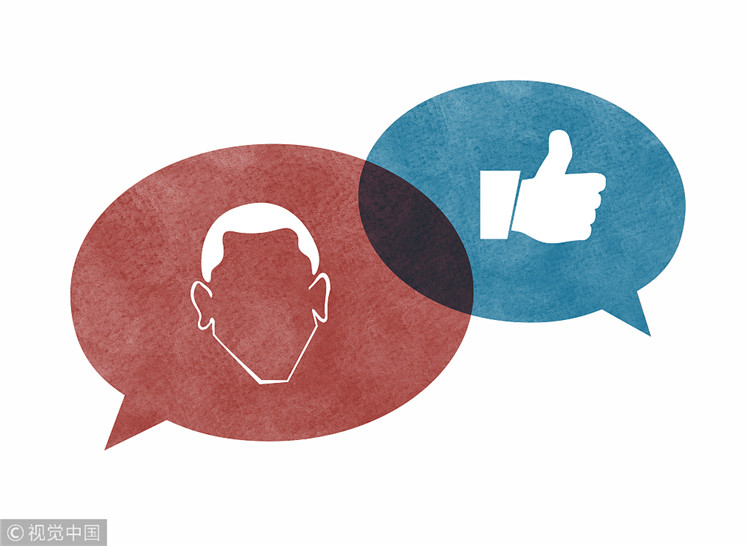
The project grew out of work that Stillwell began in 2007, when he created a Facebook app that enabled users to fill out a personality questionnaire and get feedback in exchange for allowing investigators to use the data for research. Six million people participated until the app was shut down in 2012, and about 40 percent gave permission for the researchers to obtain access to their past Facebook activities—including their history of likes.
这个项目起源于斯蒂威尔2007年开始的工作,当时他创建了一个Facebook应用程序,旨在收集用户的性格问卷,调查人员可以使用这些数据进行研究,同时提供问卷结果给用户作为使用数据的交换。在2012年,该应用程序被关闭之前,已经有600万人参与其中,其中约40%的人允许研究人员访问他们过去在Facebook上的活动,包括他们的点赞历史。
Researchers around the world became very interested in the data set, parts of which were made available in anonymized form for noncommercial research. More than 50 articles and doctoral dissertations have been based on it, in part because the Facebook data reveal what people actually do when they are unaware that their behavior is the subject of research.
世界各地的研究人员都对这些数据集产生了浓厚的兴趣,其中部分数据集以匿名形式贡献给了非商业性研究。超过50篇文章以及博士论文都是基于该研究形成的,一部分原因在于,Facebook的数据表明,人们在没有意识到自己已成为研究对象的情况下产生了这些实际行为。
COMMERCIAL APPLICATIONS
商业应用
One obvious use for such psychological insights beyond the realm of research is in advertising, as Sandra C. Matz of Columbia University and her colleagues (among them Stillwell and Kosinski) demonstrated in a 2017 paper. The team made use of something that Facebook offers to its business customers: the ability to target advertisements to people with particular likes. They developed 10 different ads for the same cosmetic product, some meant to appeal to extroverted women and some to introverts. One of the “extrovert” ads, for example, showed a woman dancing with abandon at a disco; underneath it the slogan read, “Dance like no one’s watching (but they totally are).” An “introvert” ad showed a young woman applying makeup in front of a mirror. The slogan said, “Beauty doesn’t have to shout.”
哥伦比亚大学的桑德拉 C.马茨(Sandra C. Matz)和她的同事(其中包括斯蒂威尔和科辛斯基)在2017年的一篇论文中阐述,这种心理学洞见在研究领域之外的一个明显用途是广告。该团队利用Facebook向其商业客户提供的一项功能:广告的精准投放。他们为同一种化妆品制作了10个不同的广告,其中一些旨在吸引外向的女性,另一些则是为了吸引内向的女性。例如,其中一则“外向者”广告中,一位女士在迪斯科舞厅纵情舞蹈,下面的标语写着:“孤芳自舞(然众观之)。”在一则“内向者”的广告中,一位年轻女子在镜子前化妆,标语上则写着:“美不名状。”
Both campaigns ran on Facebook for a week and together reached about three million female Facebook users, who received messages that were matched to their personality type or to the opposite of their type. When the ads fit the personality, Facebook viewers were about 50 percent more likely to buy the product than when the ads did not fit.
两项活动都在Facebook上进行了一周,总共送达了约300万名女性Facebook用户,她们收到的信息要么与自己的性格类型相匹配,要么与自己的性格类型相反。当广告类型与用户个性相匹配时,Facebook用户购买该产品的可能性比不符合情况下购买该产品的可能性高出约50%。
Advertisers often pursue a different approach: they look for customers who have bought or liked a particular product in the past to ensure that they target people who are already well disposed to their wares. In limiting a target group, it makes sense to take previous consumption into account, Matz says, but this study demonstrated the power of adapting how the message is communicated to a consumer’s personality.
广告商通常采取与之不同的方法:他们寻找过去购买或喜欢某一特定产品的客户,以确保他们的目标客户对他们的产品颇有好感。马茨认为,在限定目标群体时,将其之前的消费行为纳入考虑范围是有意义的,但这项研究也证明了信息表达方式契合消费者个性的重要性。
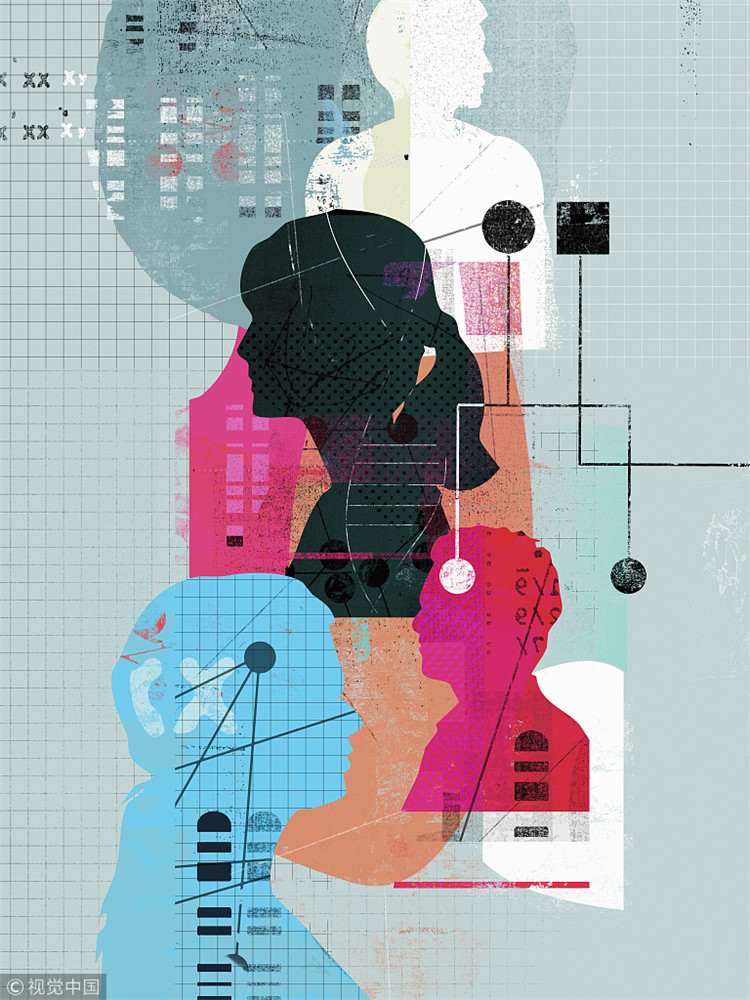
It is a power not lost on marketers. Numerous companies have discovered automated personality analysis and turned it into a business model, boasting about the value it can provide to their customers—although how well the methods used by any individual company actually work is hard to judge.
这是市场营销人员不可或缺的能力(信息表达方式要契合消费者)。许多公司都已经发掘了自动化的个性分析,并将其转化为一种商业模式,吹嘘它能为客户提供的价值——尽管我们很难判断任何一家公司使用这种方法的实际效果如何。
The now defunct Cambridge Analytica offers an infamous example of how personality profiling based on Facebook data has been applied in the real world. In March 2018 news reports alleged that as early as 2014, the company had begun buying personal Facebook data about more than 80 million users. (Stillwell’s group makes a point of emphasizing that Cambridge Analytica had no access to its data, algorithms or expertise.) The company claimed to specialize in personalized election advertising: the packaging and pinpoint targeting of political messages. In 2016 Alexander Nix, then the company’s CEO, described Cambridge Analytica’s strategy in a presentation in New York City, providing an example of how to convince people who care about gun rights to support a selected candidate. (See a YouTube video of his talk at www.youtube.com/watch?v=n8Dd5aVXLCc.) For voters deemed neurotic (who are prone to worrying), Nix proposed an emotionally based campaign featuring the threat of a burglary and the protective value of a gun. For agreeable people (who value community and family), on the other hand, the approach could feature fathers teaching their sons to hunt.
已倒闭的剑桥分析公司(Cambridge Analytica)就是一个臭名昭著的例子,这个案例展现了基于Facebook数据的个性分析如何在现实世界中得到应用。2018年3月的新闻报道称,早在2014年,该公司就开始购买约8000多万用户的Facebook个人数据(斯蒂威尔的团队强调,剑桥分析公司无法获得其数据、算法或专业技术)。该公司声称其专注于个性化选举广告,即政治信息的包装和精确定位。2016年,时任公司首席执行官的亚历山大•尼克斯(Alexander Nix)在纽约的一次演讲中描述了剑桥分析公司的战略并列举了一个例子,以说明他们如何说服关心枪支权利的人去支持特定候选人。(在YouTube网站上可以看到他的演讲视频:www.youtube.com/watch?v=n8Dd5aVXLCc)对于那些被认为是神经质(容易焦虑)的选民,尼克斯提出了一个基于情感的竞选方案,这一方案以宣传盗窃威胁论和枪支自保论为特点。另一方面,对于那些平易近人(重视社区和家庭)的人来说,这一宣传的侧重可能是父亲教儿子打猎。
Cambridge Analytica worked for the presidential campaigns of Ted Cruz and Donald Trump. Nix claimed in his talk that the strategy helped Cruz advance in the primaries, and the company later took some credit for Trump’s victory—although exactly what it did for the Trump campaign and how valuable its work was are in dispute.
剑桥分析公司曾参加特德·克鲁兹(美国得克萨斯州联邦参议员,现任NASA委员会主席。2015年5月,通过推特宣布将参加2016年美国总统大选。2016年5月4日,克鲁兹宣布退选。)和唐纳德·特朗普的总统竞选工作。尼克斯在他的演讲中声称,该策略曾帮助克鲁兹在初选中取得进展,并将特朗普的胜利归功于该公司——尽管存在着争议:它究竟为特朗普的竞选活动做了什么铺垫,这项工作的价值是什么?
Philosopher Philipp Hübl, who, among other things, examines the power of the unconscious, is dubious of the Trump claim. He notes that selling cosmetics costing a few dollars, as in Matz’s study, is very different from swaying voters in an election campaign. “In elections, even undecided voters weigh the possibilities, and it takes more than a few banner ads and fake news to convince them,” Hübl says.
哲学家菲利普·休伯(Philipp Hubl)对特朗普的说法持怀疑态度。休伯研究了诸如无意识力量等问题,他指出,在马茨的研究中,向消费者兜售几美元的化妆品和在竞选活动中摇摆不定的选民是非常不同的。休伯表示:“在选举中,即使是犹豫不决的选民也会权衡各种可能性,要说服他们,不只是几条横幅广告和假新闻那么简单。”
Matz, too, sees limits in what psychological marketing in its current stage of development can accomplish in political campaigns. “Undecided voters in particular may be made more receptive to one or another position,” she says, “but turning a Clintonista into a MAGA voter, well, that was pretty unlikely to happen.” Nevertheless, Matz thinks that such marketing is likely to have some effect on voters, calling the notion that it has no effect “extremely improbable.”
马茨也看到了当前发展阶段心理营销在政治竞选中所能达到的局限。她提到:“尤其是举棋不定的选民,可能更容易接受一个或另一个候选人。但是把克林顿的支持者变成MAGA(指特朗普标志性的“Make American Great Again”口号,这里代指特朗普)的选民,嗯......这是不太可能发生的。”不过,马茨认为,这种营销还是会对选民产生一些影响,说这种营销没有效果那是“极不可能的”。
BEYOND FACEBOOK
FACEBOOK之外
Facebook activity is by no means the only data that can be used to assess your personality. In a 2018 study, computer scientist Sabrina Hoppe of the University of Stuttgart in Germany and her colleagues fitted students with eye trackers. The volunteers then walked around campus and went shopping. Based on their eye movements, the researchers were able to predict four of the Big Five dimensions correctly.
在Facebook上的活动轨迹绝不是唯一可以用来评估你个性的数据。在2018年的一项研究中,德国斯图加特大学的计算机科学家萨布丽娜·霍普(Sabrina Hoppe)和她的同事给学生们安装了眼球追踪器,然后让志愿者们在校园里散步和购物。根据他们的眼球运动,研究人员能够准确预测五大人格维度中的其中四个。
How we speak—our individual tone of voice—may also divulge clues about our personality. Precire Technologies, a company based in Aachen, Germany, specializes in analyzing spoken and written language. It has developed an automated job interview: job seekers speak with a computer by telephone, which then creates a detailed psychogram based on their responses. Among other things, Precire analyzes word selection and certain word combinations, sentence structures, dialectal influences, errors, filler words, pronunciations and intonations. Its algorithm is based on data from more than 5,000 interviews with individuals whose personalities were analyzed.
我们说话的方式以及我们个人的语调也可能透露关于性格的一些线索。Precire Technologies是一家总部位于德国亚琛的公司,专门从事口语和书面语言的分析。该公司开发了一种自动化的求职面试方式:求职者在通话中与电脑交谈,电脑根据他们的回答生成一份详细的心理记录。此外,Precire还分析了单词的选择,特定的单词组合、句子结构、方言影响、语句错误、填充词、发音和语调——这一算法是基于5000余名电话面试者的性格数据分析而形成的。
Precire’s clients include German company Fraport, which manages the Frankfurt Airport, and the international recruitment agency Randstad, which uses the software as a component of its selection process. Andreas Bolder, head of personnel at Randstad’s German branch, says the approach is more efficient and less costly than certain more time-consuming tests.
Precire的客户包括管理法兰克福机场的德国公司Fraport,以及国际招聘机构Randstad。Randstad将该软件作为其招聘流程的一个组成部分。Randstad德国分公司人事主管安德烈亚斯•博尔德(Andreas bold)表示,与某些耗时更长的测试相比,这种方法效率更高,成本更低。
Software that analyzes faces for clues to mood, personality or other psychological features is being explored as well. It highlights both what is possible and what to fear.
研究人员还在开发一种可以通过分析面部表情来寻找情绪、性格或其他心理特征线索的软件,它会强调可能情况或担忧情况。
POSSIBILITIES AND PROBLEMS
可能性和问题
In early 2018 four programmers at a hacker conference, nwHacks, introduced an app that discerns mood by analyzing face-tracking data captured from the front camera of the iPhone X. The app, called Loki, recognizes emotions such as happiness, sadness, anger and surprise in real time as someone looks at a news feed, and it delivers content based on the person’s emotional state. In an article about Loki, one of the developers said that he and his colleagues created the app to “illustrate the plausibility of social media platforms tracking user emotions to manipulate the content that gets shown to them.” For instance, when a user engages with a news feed or other app, such software could secretly track the person’s emotions and use this “emotion detector” as a guide for targeting advertising. Studies have shown that people tend to loosen their purse strings when they are in a good mood; advertisers might want to push ads to your phone when you are feeling particularly up.
2018年初,在一个名为nwHacks的黑客大会上(nwHacks是Northwest Hacks的缩写,是在不列颠哥伦比亚大学举办的为期两天的hackathon活动),四个程序员介绍了一个通过iPhone x的前置摄像头来捕捉面部追踪数据并进行分析来识别情绪的应用程序——洛基(Loki)。例如通过对某人在阅读推送新闻时或快乐,或悲伤,或愤怒,或惊喜等情绪的识别,为其推送符合这一情绪状态的内容。在一篇关于洛基的文章中,其中一名开发者说,他和他的同事开发这款应用,是为了“证明社交媒体平台追踪用户情绪、操纵推送给用户内容的可行性”。例如,当用户查看新闻推送或使用其他应用程序时,此类软件可以秘密跟踪用户的情绪,并使用这种“情绪探测器”作为定向广告的指南。研究表明,人们在心情好的时候往往会放松钱包:因此当你心情特别好的时候,广告商可能会把广告推送到你的手机上。

Astonishingly, Loki took just 24 hours to build. In making it, the developers relied on machine learning, a common approach to automated image recognition. They first trained the program with about 100 facial expressions, labeling the emotions that corresponded to each expression. This training enabled the app to “figure out” how facial expression relates to mood, such as, presumably, that the corners of the mouth rise when we smile.
令人惊讶的是,洛基只花了24小时就开发完成了。在制作过程中,开发人员依赖于机器学习,这是一种自动图像识别的常用方法。他们首先用大约100个面部表情来训练程序,并标记与每个表情对应的情绪。这项训练使该应用程序能够“找出”面部表情与情绪之间的关系,比如,当我们微笑时,嘴角可能会上扬。
Kosinski, too, has examined whether automated image-recognition technology can surreptitiously discern psychological traits from digital activity. In an experiment published in 2018, he and his Stanford colleague Yilun Wang fed hundreds of thousands of photographs from a dating portal into a computer, along with information on whether the person in question was gay or straight. They then presented the software with pairs of unknown faces: one of a homosexual person and another of a heterosexual individual of the same sex. The program correctly distinguished the sexual orientation of men 81 percent of the time and of women 71 percent of the time; human beings were much less accurate in their assessments.
科辛斯基也对自动图像识别技术是否能从数字活动中辨别出心理特征进行了研究。在2018年发表的一项实验中,他和斯坦福大学的同事王一伦(Yilun Wang)将一个约会门户网站上的数十万张照片输入电脑,并附上有关这个人是同性恋还是异性恋的信息。然后,他们向软件展示了两张陌生面孔:一个是同性恋者,另一个是同性别的异性恋者。该程序正确区分了81%的男性和71%的女性的性取向,相比之下人类的判断就不那么准确了。
Given that gay people continue to fear for their lives in many parts of the world, it is perhaps not surprising that the results elicited negative reactions. Indeed, Kosinski got death threats. “People didn’t understand that my intention wasn’t to show how cool it is to predict sexual orientation,” Kosinski says. “The whole paper is actually a warning, a call for increasing privacy.”
考虑到世界上许多地方的同性恋者仍在为自己的生活而担忧,这一结果引发负面反应或许并不奇怪。事实上,科辛斯基在那之后就收到了死亡威胁。“人们不明白,我的本意并不是要展示能够预测性取向有多酷,”他表示,“整篇论文实际上是一个警告,是对增强隐私保护的呼吁。”
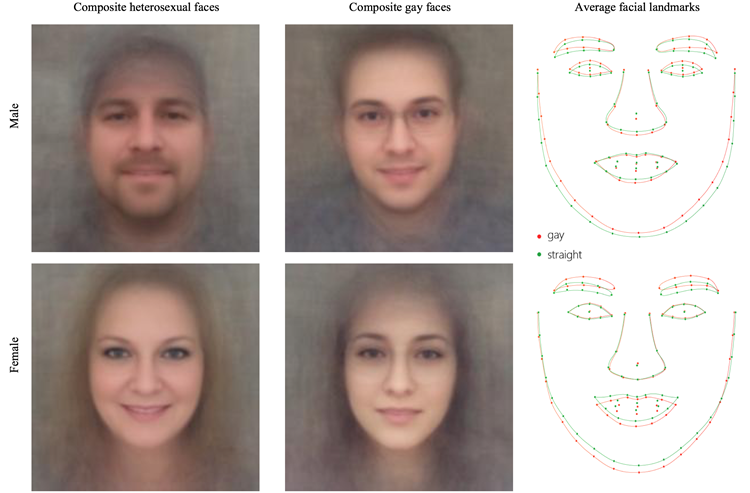
By analyzing 83 measuring points on faces, an algorithm correctly identified the sexual orientation of many men based on their photograph in a dating portal. In addition, the program generated supposedly “archetypal straight” (left) and “archetypal gay” (center) faces and calculated how the facial expressions differed on average (right). The researchers say they conducted the study partly to warn that photographs posted on the Internet could be mined for private data. Credit: Yilun Wang and Michal Kosinski; Source: “Deep Neural Networks Are More Accurate Than Humans at Detecting Sexual Orientation from Facial Images,” by Michal Kosinski and Yilun Wang, in Journal of Personality and Social Psychology, Vol. 114, No. 2; February 2018.
通过分析人脸上的83个测量点,一种算法根据约会网站上大量男性的照片,正确地辨认了他们的性取向。此外,该程序还生成了被认为是“原型异性恋”(左)和“原型同性恋”(中)的面孔,并计算出面部表情的平均差异(右)。研究人员说,他们进行这项研究的一部分原因就是为了发出警告——人们发布在互联网上的照片很可能会被挖掘为私人数据。资料来源:米哈尔·科辛斯基(Michal Kosinski)和王一伦(Yilun Wang)在《人格与社会心理学杂志》(Journal of Personality and Social Psychology, Vol.)上发表的论文《深度神经网络在从面部图像判断性取向方面比人类更准确》(Deep Neural network Are More Accurate Than human),2018年2月第二期第114册。
In late 2016 computer scientists at the Swiss Federal Institute of Technology Zurich demonstrated that the personalities of Facebook users can be pinned down more precisely if their likes are coupled with analyses of their profile photograph. Interestingly, the researchers, like many others who use machine-learning software, do not know exactly how the algorithm forms its judgment—for example, whether it relies on such features as a person’s haircut or the formality of the individual’s dress. They are in the dark because machine-learning programs do not reveal the rules they apply in drawing conclusions. The investigators know that the software finds correlations between features in the data and personality but not exactly how it concludes that a man in a photograph is attracted to other men or which characteristics in my e-mail might indicate that I am conscientious and somewhat introverted.
2016年末,瑞士苏黎世联邦理工学院的计算机科学家证明,如果将Facebook用户的喜好与他们的头像分析结合起来,就能更准确地确定用户性格。有趣的是,研究人员和其他许多使用机器学习软件的人一样,并不知道这个算法是如何形成其判断的——例如,它是否依赖于一个人的发型或穿着的正式程度等特征。他们处于黑暗之中,因为机器学习程序没有揭示他们在得出结论时应用的规则。调查人员只知道,该软件可以发现数据中的特征与性格之间的关联,但不明白它是怎样得出结论的,如一张照片中的男人会被其他男人吸引,或者我的电子邮件中的哪些特征可能表明我认真负责,或有些内向等。
“The image we are often given is that predicting personality is a kind of magic,” says Rasmus Rothe, who was involved in the Swiss study. “But in the final analysis, computer models do nothing other than find correlations.”
“通常我们形成的印象是,性格预测是一种魔法,”参与瑞士这项研究的拉斯莫斯·罗特(Rasmus Rothe)说。“但归根结底,计算机模型只能找到相关性。”
The use of facial-recognition technology for analyzing psychology is not merely an object of research. It has been adopted by several commercial enterprises. Israeli company Faception, for example, says it can recognize whether a person has a high IQ or pedophilic tendencies or is a potential terrorist threat.
人脸识别技术在心理学分析中的应用不仅仅是个研究对象。这一技术已被多家商业企业采用,例如,以色列一家名为Faception的公司表示,人脸识别技术能够识别出一个人是否具有高智商、恋童癖倾向或潜在的恐怖主义威胁。
Even if a correlation is found with a trait, experts have their doubts about the usefulness of such analyses. “All that the algorithms give us are statistical probabilities,” Rothe says. It simply is not possible to identify with certainty whether a person is Mensa material. “What the program can tell us is that someone who looks sort of like you is statistically more likely to have a high IQ. It could easily guess wrong four times out of 10.”
即使发现了与某种特征的相关性,专家们也对这种分析的有效性表示怀疑。“所有的算法给我们的都是统计概率,”罗特说。要确定一个人是否是“门萨之才”是不可能的。(门萨是世界顶级智商俱乐部的名称,于1946年成立于英国牛津,创始人是律师罗兰德·贝里尔和科学家兼律师兰斯·韦林。该社团通过充满挑战性的社团活动而使参加者的高智商获得承认、肯定和不断提高,并分享彼此的成功。)“这个程序能告诉我们的是,从数据上看长得像你的人倾向于拥有更高的智商,但它很容易就在10次中猜错4次。”
With some applications, incorrect predictions are tolerable. Who cares if Apply Magic Sauce comes to comically erroneous conclusions? But the effect can be devastating in other circumstances. Notably, when the characteristic being analyzed is uncommon, more errors are likely to be made. Even if a company’s computer algorithms were to finger terrorists correctly 99 percent of the time, the false positives found 1 percent of the time could bring harm to thousands of innocent people in populous places where terrorists are rare, such as in Germany or the U.S.
对于某些应用程序,不正确的预测是可以容忍的。谁会在意Apply Magic Sauce是否会得出可笑的错误结论呢?但在其他情况下,这种影响则可能是毁灭性的。值得注意的是,当分析的特征不常见时,很可能会产生更多的错误。即使一家公司的计算机算法在99%的情况下都能正确识别恐怖分子,但在德国或美国等恐怖分子稀少的人口稠密地区,1%的误报率也可能给成千上万的无辜民众带来伤害。
LANGUAGE RECOGNITION AND SUICIDE PREVENTION
语言识别和自杀预防
Of course, automatic psychological assessments can be used to help people live better. Suicide-prevention efforts are emblematic. Facebook has such an initiative. The company had noticed that users on its platform occasionally announce there that they intend to kill themselves. Some have even live streamed their death. An automatic language-processing algorithm is now programmed to report suicide threats to the social network’s contact checkers. If a trained reviewer determines that a person is at risk, the person is shown support options.
当然,自动心理评估可以用来帮助人们生活得更好,自杀预防便是其中很典型的一项应用。Facebook就有这样一个创举。该公司注意到,其平台上的某些用户偶尔会在那里宣布他们打算自杀,有些人甚至直播他们的死亡。如今,一种自动语言处理算法已被编程用于向社交网络联络筛查者报告自杀威胁。如果经过培训的审核员确定某人处于自杀风险中,则该用户会显示“帮助”选项。
Twitter posts might likewise be worth analyzing, according to Glen Coppersmith, a researcher at Qntfy, a company based in Arlington, Va., that combines data science and psychology to creates technologies for public health. Coppersmith has noted that Twitter messages sometimes contain strong evidence of suicide risk and has argued that their use for screening should be seriously considered.
总部位于弗吉尼亚州阿灵顿的Qntfy公司的研究员格伦·科帕史密斯(Glen Coppersmith)表示,Twitter上的帖子可能同样值得分析。科帕史密斯指出,Twitter信息有时包含自杀风险的有力证据,他认为应该认真考虑对这些信息进行筛查。
Taking a different tack, University Hospital Carl Gustav Carus in Dresden is using smartphones to measure behavioral changes, looking for those characteristic of severe depression. In particular, it is attempting to determine when patients with a bipolar affective disorder are in a manic or depressive phase (see “Smartphone Analysis: Crash Prevention”).
德累斯顿大学卡尔·古斯塔夫·卡鲁斯医院采取了不同的策略,利用智能手机测量行为变化,寻找重度抑郁症的迹象。值得一提的是,它试图确定双向情感障碍患者何时处于躁狂或抑郁阶段(参见文末相关链接)。
Even designers of algorithms that are created with good intentions must balance the potential for good against the risk of privacy invasion. Samaritans, a nonprofit organization that aims to help people at risk of suicide in the U.K. and Ireland, found this out the hard way a few years ago. In 2014 it introduced an app that scanned Twitter messages for evidence of emotional distress (for example, “tired of being alone” or “hate myself”), enabling Twitter users to learn whether friends or loved ones were undergoing an emotional emergency. But Samaritans did not obtain the consent of the people whose Tweets were being collected. Criticism of the app was overwhelming. Nine days after the program started, Samaritans shut it down. The Dresden hospital has not made the same mistake: it obtains permission from participants before it monitors their smartphone use.
即使是出于好意而创建算法的设计者,也必须在潜在的好处和侵犯隐私的风险之间保持平衡。“撒玛利亚人(Samaritans)”是一个旨在帮助英国和爱尔兰有自杀倾向的人的非营利性组织,几年前它在艰难的实践中发现了这一点。2014年,该组织推出了一款应用程序,这一程序可以扫描Twitter上的信息,寻找精神折磨的证据(例如,“厌倦了独处”或“讨厌自己”),让Twitter用户了解朋友或亲人是否遭遇了情绪异常情况。但是Samaritans并没有得到信息来源用户的同意,对这款应用的批评铺天盖地。该项目启动9天后,不得不关闭Samaritans。德累斯顿医院没有犯同样的错误:它在监控参与者使用智能手机之前,会先征得他们的许可。
Automated psychological assessments are becoming a part of the digital landscape. Whether they will ultimately be used mainly for good or ill remains to be seen.
自动心理评估正在成为数字领域的一部分,它们在运用过程中最终将发挥好或坏的作用还有待观察。
延伸阅读
SMARTPHONE ANALYSIS: CRASH PREVENTION
智能手机分析:防止情绪奔溃
If Jan Smith (a pseudonym) were to spend the morning in bed and miss a class, his absence would definitely sound an alarm. This is because the 25-year-old student has a virtual companion that is pretty well informed about the details of his daily life—when he goes for a walk and where, how often he calls his friends, how long he stays on the phone, and so on. It knows that he sent four WhatsApp messages and two e-mails late last night, one of which contained more than 2,000 keystrokes.
如果简·史密斯(化名)一早上都躺在床上而错过了一节课,一定会产生缺席警报。这是因为这个25岁的学生有一个虚拟的,非常了解他日常生活细节的“同伴”——他什么时候去散步,在哪里,给朋友打电话的频率,他打电话的时长等等。这个同伴还知道他在昨晚深夜发送了4条WhatsApp消息和两封电子邮件,其中一封有超过2000个单词。
Smith suffers from bipolar disorder, a mental illness in which mood and behavior constantly swing between two extremes. Some weeks he feels so depressed that he can hardly get out of bed or manage the basic tasks of everyday life. Then there are phases during which he is so euphoric and full of energy that he completes projects without seeming to need sleep.
史密斯患有双向情感障碍,这是一种情绪和行为经常在两个极端之间摇摆的精神疾病。有几周,他感到非常沮丧,几乎不能起床,也无法处理日常生活中的基本任务。还有一些阶段,他非常兴奋,充满活力,完成项目时似乎不需要睡觉。
Smith installed a program on his smartphone that records all his activities, including not only phone calls but also his GPS and pedometer readings and when he uses which apps. This information transfers to a server at regular intervals. Smith is taking part in a study coordinated by University Hospital Carl Gustav Carus in Dresden. The goal of the project, known as Bipolife, is to improve the diagnosis and treatment of bipolar disorders. Researchers intend to monitor the smartphones of 180 patients for two years.
史密斯在他的智能手机上安装了一个程序来记录他所有的活动,不仅包括电话通话,还包括他的GPS和计步器读数,以及他何时使用哪些应用程序,这些信息会定期传输到服务器。史密斯正在参加德累斯顿大学卡尔·古斯塔夫·卡鲁斯医院协调的一项研究。这项名为Bipolife的项目的目标是改善双相情感障碍患者的诊断和治疗。研究人员打算对180名患者的智能手机进行为期两年的监测。
They plan to collect moment-to-moment information about each participant’s mental state. Such data should be useful because bipolar patients are often unaware when they are about to have a depressive or manic episode. That was certainly Smith’s experience: “When I was on a high, I threw myself into my work, slept maybe three or four hours, and wrote e-mails to professors at three in the morning. It never occurred to me that this might not be normal. Everyone I knew envied my energy and commitment.”
他们计划收集每个参与者每时每刻的精神状态信息。这些数据将发挥作用,因为双相情感障碍患者往往不知道他们什么时候会陷入抑郁或躁狂发作。这无疑是史密斯的经历:“当我情绪高涨时,我往往会全身心地投入到工作中,只睡上三四个小时,凌晨三点还在给教授们写电子邮件。我从来没有想过这可能不正常,我认识的每个人都羡慕我的精力和奉献精神。”
The smartphone app is meant to send up warning flares. “The transferred data are analyzed by a computer algorithm,” explains Esther Mühlbauer, a psychologist at the Dresden hospital. For example, it recognizes when a participant makes significantly fewer phone calls or suddenly stops leaving the house—or works around the clock, neglecting sleep. “If our program sees that, it automatically e-mails the patient’s psychiatrist,” Mühlbauer says. Then the psychiatrist gets in touch with the patient.
这款智能手机应用意在发出警告信号。德累斯顿医院的心理学家Esther Muhlbauer解释说:“传输的数据将通过计算机算法进行分析。”例如,当一个参与者打的电话明显变少,或者突然不出门、不睡觉,它就会识别出来。“如果我们的程序看到这一点,它就会自动给病人的精神科医生发送电子邮件,随后精神病医生与病人将取得联系。”Esther Muhlbauer说。
The researchers first have to get a baseline, determining, for example, how particular patients use their cell phones during asymptomatic phases. Then the software notes when the behavior deviates from a patient’s norm so that treatment can be given quickly. Smith finds this monitoring very reassuring: “It means that there is always someone there who looks after my condition,” he says. “This can be a significant support, especially for people who live alone.”
研究人员首先要设定一个基准,例如确定特定患者在无症状期如何使用手机。然后该软件会记录下患者的行为何时偏离了正常水平,以便快速进行治疗。史密斯发现这种监控非常令人放心:“这意味着总有人在照顾着我的病情,”他认为,“这可能是一个重要的支持,特别是对那些独居的人来说。”
注:《最了解你的不是另一半 而是互联网》来源于Scientific American(http://www.cbdio.com/BigData/2019-03/28/content_6060100.htm)。数据观王婕/编译,转载请注明译者和来源。

永洪BI
更敏捷、更快速、更强大